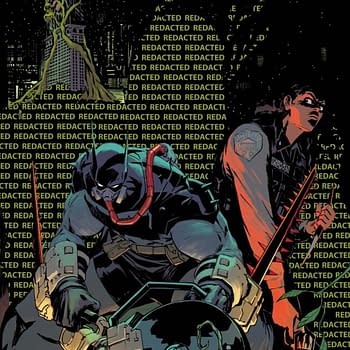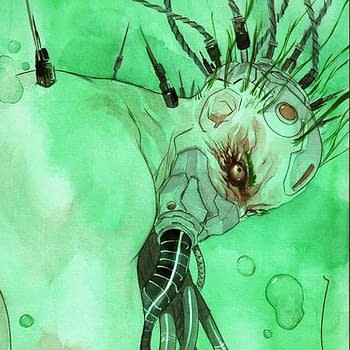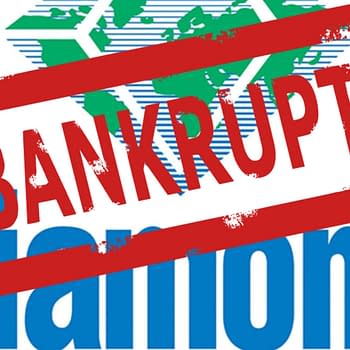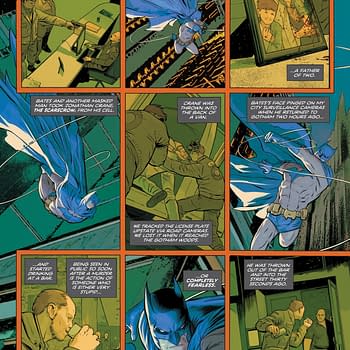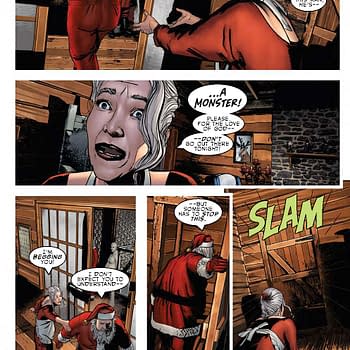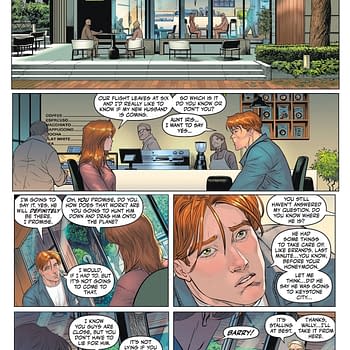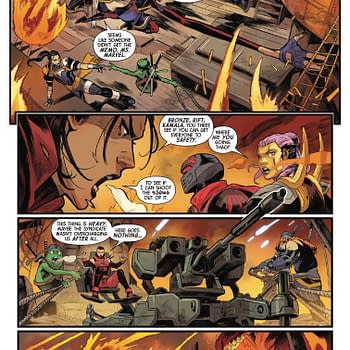Posted in: Comics | Tagged: Comics, entertainment
"If Film Rights Were Owned By Marvel, The X-Men Would Probably Still Be The Paramount Book In The Canon" – Chris Claremont Talks Shop At NYCC
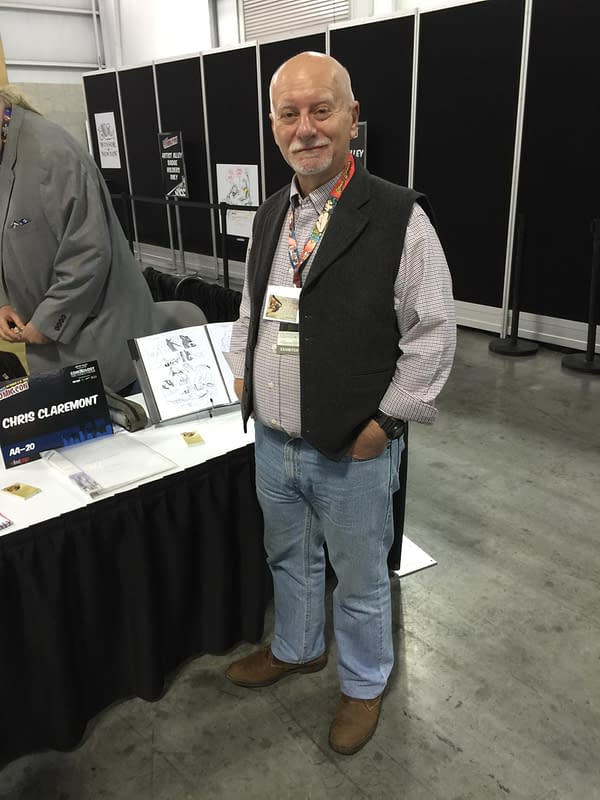
Chris Claremont talked with Hugh Sheridan at New York Comic Con a few weeks back. he was rather candid.
Hugh Sheridan: So can you give me a scoop? Can you finally reveal what exactly Wolverine is "the best there is" at?
Chris Claremont: A surprising number of things, but what he does very best is not very nice and it isn't needlecraft.
He is what the name implies. He is a warrior, a hunter, a killer. His specialities – like it or not – are the darker aspects of human interpersonal interaction. But at the same time they are countered by a soul and an intellect which is forever striving to be something better.
Which is why, if you ever walk in to his flat or his room at the mansion, you'll see it almost bisected by an invisible line. On one side is total chaos – beer cans, everything – the other side is absolutely pristine stylistic and design perfection, primarily derived from a Japanese source because that's where his concept of form and structure is defined.
But that is the yin and yang of his personality. He is a raw elemental striving to be a rational sane intellect and soul and the battle is what defines him.
HS: Throughout all your work on the X-Men is there any issue or storyline that you are most proud of?
CC: #94 through #279 – it's all one story. It's subdivided in to chapters and moments and to bursts of connected story-arcs, story moments, but it's all one life, one coherent continuous evolving vision and that isn't simply restricted to X-Men it encompasses New Mutants, Excalibur, Wolverine – all the related concepts.
HS: There have been a number of blog retrospectives of your run over the last few years and a lot of them note that the evolution of Magneto as a character is the central through line of your initial run – is that something that you would see?
CC: It has never been restricted to any one character – it's contiguous with all of them. Magneto has the distinction of being the most direct and focused of them because it was also, in my vision of it, the one that would have a happy ending, as opposed to Phoenix which didn't.
For me Magneto's presence in the X-Men was an exercise in personal maturity and evolution and realisation that his struggles over the years -walking the dark side of the equation to achieve his ends – had been unsuccessful and like it or not maybe Charlie has a point? So when after #200 when Charlie was wounded and evacuated to the Shi'ar he turned the school over to him – he trusted his lifelong friend to take care of the children.
So Magneto is suddenly bound by a different set – he's not thinking solely of himself, he's not thinking solely of adults – he is suddenly dealing with children and for him this was exemplified in #150 when by accident he struck down Kitty he realised "oh my god I've just almost killed the very people I'm fighting to save, what have I become?"
This is his attempt to find a way to redeem himself and the struggle for me was -the ideal for me was that he would embrace the heroism, the humanity; embrace the role of teacher and mentor, but would always be tempted by the dark side of the force.
And the New Mutants', his students, role was to learn from him but more importantly keep him anchored to the straight and narrow. He might be willing to take that one fatal step to say "It's for the best, I'll just take this one step and then I'll step back" and they'll say "No, you won't, because you'll be screwing us!" and that to me represented a laudable ongoing heroic struggle in him where there was not its analogy in Charles.
Charlie was already a good, noble, decent, heroic boss – the hero – there was nothing more to be done with him other than demean him, which I had no interest in doing. But Magneto on the other hand was ripe for exploitation. Unfortunately corporate had different ideas.
HS: When you returned to the X-Men were you reluctant to use that character then because you felt you had said everything you wanted to with him?
CC: The Magneto I was given at that point wasn't my character. None of them were my characters at that point. My vision of the X-Men effectively ended with #279.
HS: Would you include X-Men Forever in your vision?
CC: No, that was more that – that was where we would have tried to go otherwise. The unfortunate thing was that they didn't last very long. But the market had changed – it had been too long since we had done any of that and there was too much competition from books that were – it's always been the case that the ongoing current titles are more sales effective than retrospective titles simply because readers have more interest in it meaning something to them, whereas the retrospective stuff are kind of "what if?" And what ifs are not popular because you can take them or leave them and they don't really matter.
If I could have jumped up and said "This is the current run of X-Men! take it or leave it" maybe that would have made a difference, but that wasn't what the corporation wanted.
HS: When you started on X-Men the series was close to cancellation, and over the 16 years you wrote the book it became Marvel's leading franchise. Your X-Men #1 from 1991 remains, I think, the highest selling American comic ever. But in the last few years the X-Men have faded a little and they are no longer the industry's top sellers, what advice would you give Marvel to get them back on top?
CC: That has nothing to do with comic sales, that has everything to do with the fact that the film rights are controlled by a rival corporation.
I guarantee you that if 10 years ago, when Marvel was approached by Disney, if the X-Men film rights were owned by Marvel Studios and not Fox the X-Men would probably still be the paramount book in the canon. The reason for the emphasis on the other titles is because Marvel / Disney control the ancillary film rights whereas all the film rights for the FF- the Fantastic Four – and the X-Men are controlled by Fox who has no interest in the comic books.
So I think the corporate publishing attitude is: "why would we go out of our way to promote a title that will benefit a rival corporation's films when we could take that same energy and enthusiasm and focus and do it for our own properties?"
Hence the rise of the Inhumans as the new equivalent of the mutants. I could wish for something else but it ain't my 5 billion dollars.
HS: So you think that eventually those characters will come back up? That those characters are so compelling that eventually, if the rights issues are resolved, they will go back to being the top-sellers? Is it just a matter of promotion?
CC: It's not a matter of promotion, it's purely a matter of ownership. If at some point Fox decides that the X-Men properties are no longer lucrative I'm sure that they will cut a deal with Disney. But I also expect that the deal they would want to cut would be extra-ordinarily expensive and Disney or Marvel might just as easily say "screw it" we love the X-Men but we are not going to hurt ourselves to get it because we have our other properties that we own that are doing far better. If you want to give it back or take a reasonable deal that's one thing, if you're just going to go crazy screw you.
Those are questions better posed to [Marvel Editor-in-Chief] Axel [Alonso] and the Marvel group than me, my opinion at this point is effectively as valid as any fan in this building.
HS: Well, you are the architect –
CC: No, no – we are talking business, we are talking corporate – that has absolutely no impact at all.
HS: Are you still working for Marvel? Are you still employed by them?
CC: Yes
HS: Do you have any projects coming out?
CC: No. That's – again, that's a question for Axel. I am at their convenience.
HS: Are there Marvel characters that you would like to do something with?
CC: I have written every character they have got, one way or another. So I mean I've done pretty much all I was interested in doing. It's a mutually agreeable relationship I suspect.
HS: Okay – talking about films –you were very involved with George Lucas in writing the novel sequels to Willow [The Chronicles of the Shadow War trilogy – Shadow Moon, Shadow Dawn and Shadow Star]. Warwick Davis always says that a film sequel might happen – have you heard anything about that? Could your work be involved?
CC: I'm the writer – I'm the last to know. It would be fun, I would love it if they wanted to do a film adaptation of the novels but that is not my call.
HS: Looking back over your career you have worked with some amazing artists –
CC: One of them is right over there – Adam Hughes!
[Claremont gestured at a table across the hall]
HS: Oh yeah – that was Star Trek: Debt of Honor – would you want to work in Star Trek again?
CC: Been there, done that. I've done my Star Trek story and which Star Trek do you want to use? there are 15 of them over the years!
No, I want to do what I'm doing – my own stuff. But the reality is that you have to find an artist, you have to find a publisher. The stuff I was working on recently was sold in France and the publisher promptly went out of business, the rights are stuck on the far side of the pond. So you take as many shots at the wall as possible.
HS: What was that series called?
CC: Wanderers – it's a 3 part medieval world dark fantasy set in the 7th Century AD, in real history. And it's a lot of fun. The art is by a french artist who promptly signed a contract with Marvel.
HS: Any plans to do anything with Sovereign Seven?
CC: I am putting something together with Sovereign – well with characters based on Sovereign.
HS: For DC or on your own?
CC: No, this is mine. I'm contractually not allowed to work in comics in the United States other than for Marvel, this is all outside the field.
HS: I was going to ask you earlier about the artists you have worked with – was there ever any artist that you felt was best at expressing your ideas ?
CC: The one I haven't worked with yet!
You can go all around this fields and go to all the artists I have worked with and you will find basically a collection of the finest talents and skills in recent history in this business – how do you choose among those guys (Or people I should say because there is women as well)?
No, I don't play favourites.
HS: What about John Byrne? Would you work with him again? Do you still have a relationship with him? You worked together on a Justice League story [JLA: The Tenth Circle] a few years ago ..
CC: Yeah, I scripted a story at DC's request that John had plotted and drawn but we haven't really talked about collaboration or at all.
HS: It would be a big deal if you worked together again on something X-Men related
CC: The retailer fantasy of the century is if John and Terry [Austin, the inker on their classic Uncanny X-Men run] and I got together for a special edition or run. It would be fun. On the other hand it could also fall flat on its face and embarrass all of us, so I'll believe it when I see the pencils.






